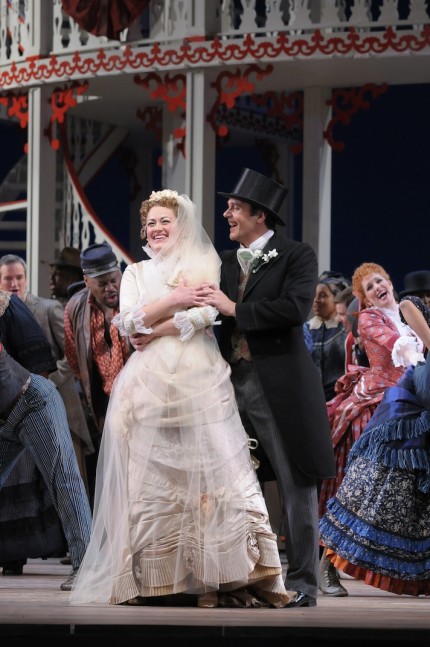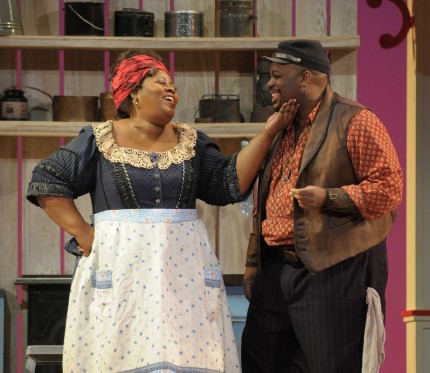A triumphant “Show Boat” rolls along magnificently at Lyric Opera

When the Lyric Opera of Chicago announced its 2012-13 season last month, the prepared press material and remarks were more important for what they didn’t say—about the company’s musical theater initiative. The Lyric received criticism from many subscribers—as well as some press—for placing Show Boat on this season’s main schedule, and thereby cutting the company’s usual eight-opera season to seven. There was nary a mention of the Lyric’s spring 2013 production of Oklahoma in the official presentation about next season. And with future company musicals off subscription and taking place in the postseason, general director Anthony Freud wisely seems intent on drawing a line between the genres and showing that the Lyric Opera’s principal business will remain opera.
So, with the controversy about the Lyric Opera’s musical theater initiative largely put to rest, one could take the company’s new production of Show Boat, which opened Sunday afternoon, on its own merits. And with one not insignificant exception, the Lyric’s Show Boat proved a triumph—a stylish, fast-paced and colorful show that had the capacity audience on its feet cheering loud and long at the curtain.
When Show Boat opened in 1927, American musical theater consisted of either revue-type burlesque shows with Ziegfeld-girl eye candy or featherweight scenarios of college romances replete with flappers and raccoon coats.
With Show Boat composer Jerome Kern and lyricist Oscar Hammerstein II forcibly lifted the American musical out of its frivolous origins. With a key miscegenation subplot, the creators shined a bright light on America’s sorry racial history—a courageous act in 1927—and showed that the musical can be a richer, deeper, more serious art form, paving the way for works to come like Carousel, West Side Story and Rent.
Adapted from Edna Ferber’s sprawling novel, the story covers nearly a half-century in the life of Magnolia Hawks, daughter of Captain Andy of the Cotton Blossom showboat, who meets and falls in love with the charming but feckless gambler Gaylord Ravenal. Their history takes them to Chicago at the 1893 World’s Fair, where Ravenal abandons his wife and their young daughter Kim, and into the jazz age. The tale comes full circle back to the showboat for a tear-jerking if improbable finale in which the aged, guilt-stricken Ravenal returns to reunite with Magnolia—now a celebrated and successful singer—and their grown-up daughter. The darker secondary plot concerns Magnolia’s friend Julie, who is forced to leave the Cotton Blossom when it is revealed that she is half black and in a mixed-race marriage with Steve, which ultimately leads to her alcoholism and ruin.
Yet even more than the compelling storyline and blend of broad humor and stark drama it is the rich score that has kept Show Boat a beloved perennial, with such standards as Can’t Help Lovin’ Dat Man, Make Believe, Old Man River and You Are Love, all in the first act alone. There are a multitude of alternate songs written for various revivals and the 1936 film, and conductor John DeMain and director Francesca Zambello have done a masterful job of choosing material, restoring some gems—like the ominous chorus Mis’ry’s Comin’ Aroun‘—and giving welcome additional stage time to the principal African-American characters, Joe and Queenie.
The essential difference between opera and musical theater is that opera is primarily about voices while theater is primarily about songs and the production. And with the voices discreetly amplified for both dialogue and singing in this Show Boat, any evaluation of the vocalism has to come with a significant asterisk attached.
Nathan Gunn was born to play the role of the handsome, irresponsible gambler Ravenal. At times one missed the high notes that a tenor would have brought to the role and Gunn’s burnished baritone sounded stretched on top. But he sang with a natural ease and comfort in the idiom and brought the right raffish charm to the role.
Alyson Cambridge sounded decidedly light-voiced as Giulietta in the Lyric’s Tales of Hoffmann last fall, but, possibly aided by the electronic simonizing, was heard to much greater and richer-toned advantage as the ill-fated Julie. She brought just the right dreamy romanticism and jazzy swing—and some nifty dancing—to Can’t Help Lovin’ Dat Man and delivered a heart-breaking, deeply felt rendition of Bill in Act 2.
Morris Robinson is making his belated company debut as Joe and his imposing bass and easy stage presence proved ideal for the role. While his Old Man River didn’t quite have the world-weary weight and eloquence it should have on Sunday, the anthemic classic gained in dramatic impact with each iteration.
The show was nearly stolen by Angela Renee Simpson as the cook Queenie, Joe’s wife. Sassy and big-voiced with every word crystal-clear, Simpson well earned her two showpiece numbers, Queenie’s Bally-Hoo and Hey, Fellah!
Surprisingly the one disappointment in the cast was the singer one expected to be most at home, Ashley Brown. She won acclaim for her Mary Poppins on Broadway, but seemed completely miscast as Magnolia. Brown’s mugging and arch and precious portrayal made Magnolia seem less like an innocent girl in love and more like the ditzy sister of the troupe’s air-brained dancer Ellie Mae. Even with the plug-in, her voice sounded thin and fluttery, bright top notes apart. Brown brought more gravitas to the drama of Act 2, yet there was little warmth or sincerity to her romantic scenes and duets with Gunn and her elaborate arm gestures while singing were distracting and bizarre.
As the Cotton Blossom’s comic duo, Ericka Mac as Ellie Mae and Bernie Yvon as Frank proved more adept as dancers than singers but handled the humor with energy and relish. Ross Lehman was a fine, blustery Captain Andy, and Cindy Gold admirable as his battle-axe wife, Parthy. James Farruggio as Steve, Caroline Heffernan as the young Kim, Brian McCaskill as the villain Pete and John Lister as the Sheriff rounded out the cast.
John J. Davison’s sets were striking and imaginative. The towering principal design for the Cotton Blossom was certainly imposing but didn’t convey the sense of actually being on a boat, looking more like an elaborate three-level gazebo. The drops for the Chicago World’s Fair, Ontario Street apartment, Palmer House, and Trocadero nightclub were less spectacular but atmospheric and effective, aided by Paul Tazewell’s evocative period costumes.
Having to field two separate choruses, one black and one white, was likely a daunting task but smoothly accomplished with worthy singing by all under chorusmaster Michael Black. Michele Lynch’s choreography brought fine vigor and energy to the dance sections, particularly those devised for the black ensemble.
Give director Francesca Zambello credit for pulling together an extraordinarily large and complicated show, keeping the action moving with fluent scene changes and mostly natural stage movements for the extras and chorus. Her textual decisions were also sound, keeping the offensive “n word” in the mouth of the villain Pete but eliminating it from the opening chorus. She was less successful at conveying the sense of four decades passing, with Magnolia looking the same in late middle age as she did as a teenager.
John DeMain is a long-experienced hand at this score, having conducted a celebrated Show Boat at Houston Grand Opera in 1982. His tempos seemed mostly spot-on, though the 1920’s jazz flavor of Dance Away the Night was diluted at a stately tempo. Largely using Robert Russell Bennett’s original 1927 orchestrations, DeMain drew fizzing and rhythmically vital playing from the Lyric Opera Orchestra.
Show Boat runs through March 17. lyricopera.org; 312-294-3000.
Posted in Performances






Posted Feb 13, 2012 at 12:55 am by Rickie (Mrs. William) Cooley
I am so pleased with this spot-on review. I will not see the show until March, but listened to the live stream and attended the symposium prior to the opening, and I feel that all of the remarks are fair and to the point. While I am ambivalent about operatic voices singing roles in shows such as Showboat, I hope Lyric will hurry up and present Camelot, so that Nathan Gunn can repeat his stunning portrayal of Lancelot, a role for which he is even more suited than Ravenal.
Posted Feb 13, 2012 at 10:56 am by Laura
I also agree with this review, and prefer to hear these glorious songs performed properly, as trained opera singers can do. They are sung beautifully, sensitively, and intelligently-one does not get the chance to experience this type of quality for musical theatre very often. Don’t miss this production!
Posted Feb 13, 2012 at 4:43 pm by Jon E. Szostak, Sr.
I DON’T agree totally with this review! Each and every negative statement (in my opionion)is simply wrong! Brown’s portrayal of ‘Magnolia’ grew with each scene and her voice (as with ALL the others) was finely suited to her role.
The sets and costumes are simply gorgeous! The dancing is spectacular! There’s not a weak member of the cast or a dead moment in the action. I’ve been a professional opera singer/performer since 1961 and can heartily recommend this show to all who crave great theater. This is as good as it gets! Life is short, so part with a few bucks and treat yourself and your significan other to a great time…you won’t regret it!
Posted Feb 16, 2012 at 12:22 pm by Bruce
The amplified singing gave the show an artificial feel….hardly an “operatic” treatment (esp. Ashley). Worse why would ANYONE pay ticket prices rising over $200 when GREAT seats at a well rehearsed professional musical like South Pacific or many others are a few blocks away at $80 and they are GREAT seats. By the way ALL THE dialogue will be heard and not “mushy” in parts of the theatre. Also how many millions of dollars is Lyric prepared to LOSE in advertising and production costs (let alone operating costs) before the actual OPERA season suffers to become a shadow of past memories